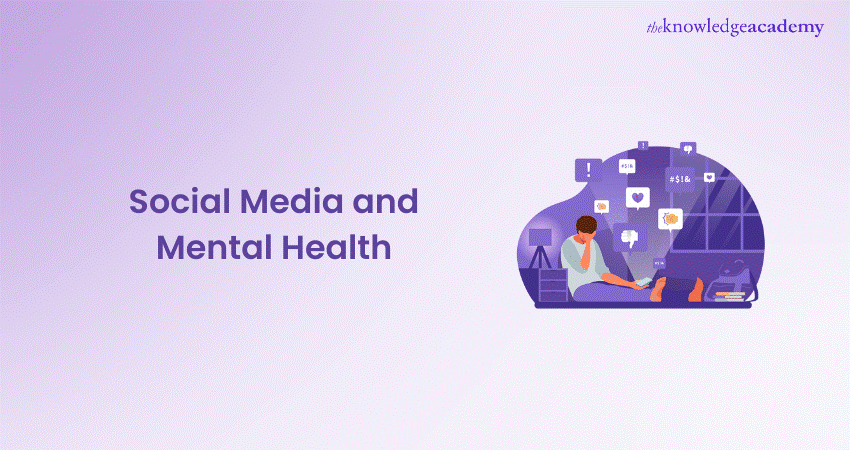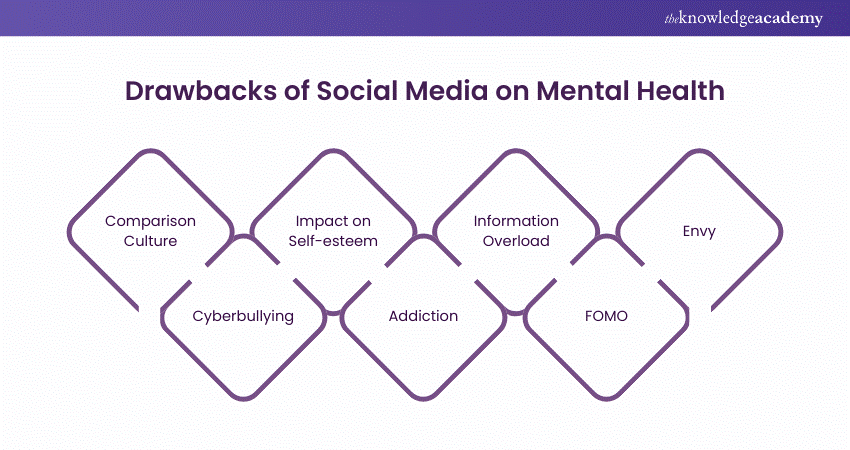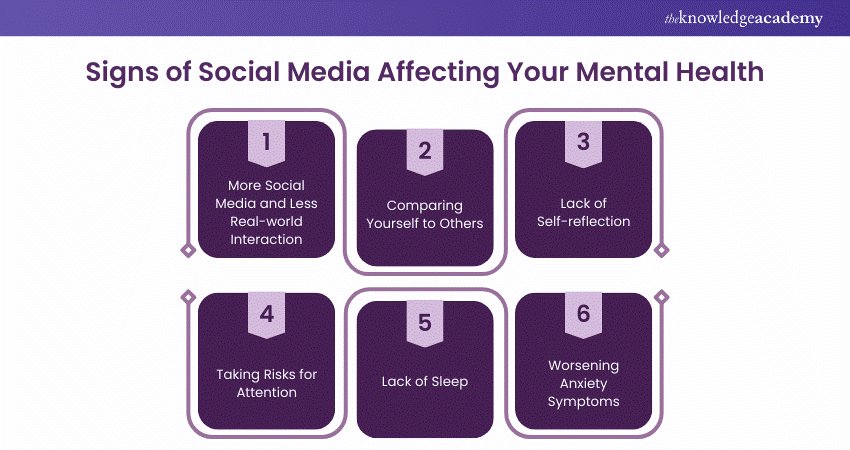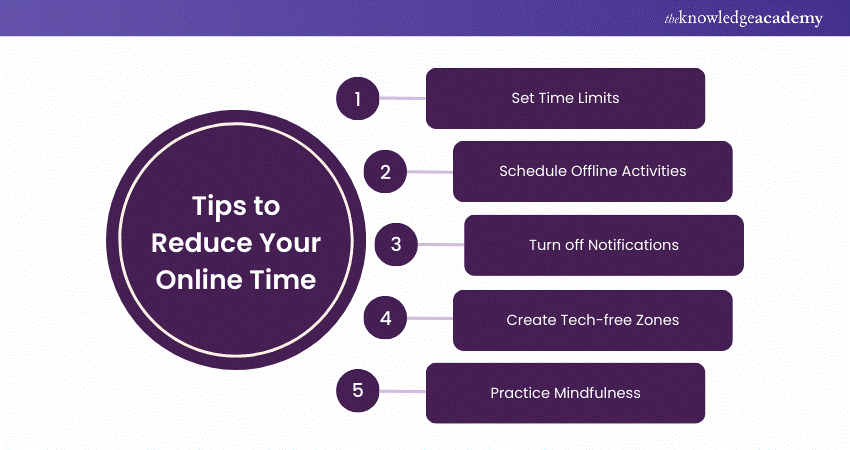We may not have the course you’re looking for. If you enquire or give us a call on +44 1344 203 999 and speak to our training experts, we may still be able to help with your training requirements.
Training Outcomes Within Your Budget!
We ensure quality, budget-alignment, and timely delivery by our expert instructors.

These days, the relationship between Social Media and Mental Health has become a topic of crucial interest and concern. But can scrolling through Instagram or tweeting on Twitter impact an individual’s well-being? Or can the virtual connections formed online truly replace real-world interactions? This blog delves into the intricate ways Social Media affects Mental Health, exploring both its benefits and potential pitfalls.
While tools like Facebook and Snapchat offer unprecedented connectivity, they also pose risks that can lead to feelings of isolation and anxiety. Hence, understanding the complex dynamics of Social Media and Mental Health is crucial for effectively navigating online lives. Read this blog to unpack the psychological effects on your mental well-being in the age of Social Media.
Table of Contents
1) How Does Social Media Affect Mental Health?
2) Positive Impacts of Social Media on Mental Health
3) Negative Impacts of Social Media on Mental Health
4) Is Social Media Affecting Your Mental Health?
5) Tips for Healthy Social Media Habits
6) Conclusion
How Does Social Media Affect Mental Health?
Humans have always relied on each other, so they crave social connections. They need support from those around them to achieve success and happiness. Strong social bonds positively impact our Mental Health, reducing stress, increasing self-worth, preventing loneliness, and even extending lifespan. Conversely, lacking social connections can lead to anxiety and depression, severely affecting Mental Health and self-esteem.
Platforms like Twitter, Facebook, Snapchat, and Instagram were created to provide virtual social connections. While they keep everyone connected, they also widen the gap between virtual and real-world interactions. Excessive usage of Social Media is one of the significant Factors affecting Mental Health, as it might result in isolation, loneliness, and anxiety, since it cannot replace real-world connections.
Positive Impacts of Social Media on Mental Health
While Social Media for Mental health has its share of certain drawbacks, it is essential to acknowledge that these platforms can also positively affect our well-being. Some of these positive effects are as follows:
1) Building Supportive Communities
Social Media tools serve as virtual communities where individuals have the option to connect with others who share similar interests, experiences, or challenges. These communities further provide a safe space for people to seek advice, share their thoughts, and receive support from others who understand their journey.
Connecting with like-minded individuals can alleviate feelings of loneliness and create a sense of belonging, fostering positive Mental Health outcomes.
2) Access to Resources
It has become a valuable platform for disseminating information about Mental Health and providing access to resources. Many Mental Health organisations, professionals, and advocates use Social Media to raise awareness, share educational content, and provide tools for self-care and self-improvement.
Additionally, individuals can gain knowledge about Mental Health conditions, learn coping strategies, and access helplines or support services.
3) Reducing Stigma
Social Media has had an important standing in reducing the stigma around Mental Health. Many individuals have embraced the power of sharing personal stories and experiences openly on platforms. By sharing their journeys, challenges, and triumphs, they help normalise conversations about Mental Health and create a supportive environment, where others are comfortable while seeking help.
This transparency and willingness to be vulnerable help diminish stigma, build a sense of community, and promote empathy.
4) Promoting Positive Initiatives
Social Media has become a catalyst for promoting positive Mental Health initiatives and campaigns. Various online challenges, hashtags, and movements encourage individuals to prioritise self-care, practice gratitude, and engage in acts of kindness.
These initiatives create a ripple effect, inspiring others to take care of their mental well-being and fostering a collective commitment to Mental Health.
5) Fostering Expression
Social Media platforms provide individuals with a creative outlet to express themselves and share their talents with the world. Through visual content, such as photography, art, and videos, people can showcase their creativity, share their passions, and inspire others.
Engaging in creative activities and appreciating the creativity of others can contribute to positive emotions, self-expression, and overall mental well-being.
Don’t let stress hold you back - register for our Handle Stress And Develop Your Resilience Course and turn challenges into opportunities!
Negative Impacts of Social Media on Mental Health
The negative impact Social Media has on its users can be listed as follows:

1) Comparison Culture
One of the significant impacts of Social Media on Mental Health is the emergence of a pervasive comparison culture. Platforms like Facebook, Instagram, and Twitter showcase the highlight reels of people's lives, portraying seemingly perfect vacations, relationships, and accomplishments.
Constant exposure to these curated and often unrealistic portrayals might lead to feelings of inadequacy, low self-esteem, and a distorted perception of reality.
2) Addiction
Social Media addiction is a still-growing concern in the digital age. The constant urge to check notifications, scroll through news feeds, and seek validation through likes and comments can become addictive.
This addiction can negatively affect Mental Health, leading to anxiety, stress, and feelings of isolation. Moreover, excessive Social Media use can disrupt sleep patterns and hinder productivity.
3) Cyberbullying and Online Harassment
Social Media platforms might provide a breeding ground for cyberbullying and online harassment. The anonymity and distance offered by the online environment make it easier for individuals to engage in hurtful behaviour without immediate consequences.
Victims of cyberbullying often experience significant psychological distress, including increased levels of anxiety, depression, and a decline in self-esteem. The constant exposure to negative comments and online harassment can have long-lasting effects on mental well-being.
4) Fear of Missing Out (FOMO)
The Fear of Missing Out, abbreviated to FOMO, is a psychological phenomenon amplified by Social Media. Seeing others' experiences, social gatherings, and events through posts and photos can evoke a sense of exclusion and a fear of being left out.
This fear often results in anxiety, restlessness, and a constant need to stay connected to Social Media tools to avoid missing out on the latest updates and events.
5) Impact on Body Image and Self-esteem
Social Media platforms often prioritise physical appearance, leading to a significant impact on body image and self-esteem. The constant exposure to carefully edited and filtered images can create unrealistic beauty standards and perpetuate body dissatisfaction. This may lead to the onset of eating disorders, body dysmorphia, and a negative self-image.
Boost your brainpower with our Mental Capacity Training – sign up now and discover techniques to sharpen your mind!
Is Social Media Affecting Your Mental Health?
When talking about the impact Social Media has on one’s Mental Health, it depends on how they feel after using it. Although no specific time frame for using Social Media can dictate one’s Mental Health, using it more than a person's threshold limit may become the leading cause of depression.
Here are some signs that will help you clarify if Social Media is affecting a person negatively:

a) Social Media causes many distractions when you are trying to enjoy a real moment with your friends and family. If you are one of those people who constantly check their phone repeatedly within a few minutes, you might be having a negative impact on Social Media.
b) Comparison is the death of joy because when you compare yourself unfavourably, you end up hating the positive aspects of your life. This can also have a serious impact on your health, leading to low self-esteem and eating disorders.
c) If you are getting a lot of attention on Social Media, it becomes easy to forget your flaws. Using Social Media too often also takes away your precious time that could have been used to think about your important plans and aspects of life.
d) Every other day, you encounter new cases where youngsters take risks just to gain likes and engagement on Social Media platforms. Sometimes, situations are so critical that chasing clout without thinking about repercussions results in death. Examples of risky behaviour can be using a phone while driving, doing dangerous pranks over others, or cyberbullying.
e) Sleep is vital for a healthy body and sound mind. If you don't fall asleep without using Social Media for hours or using your phone is the first thing you do every morning, Social Media is the problem behind your disrupted sleep cycle. Disruption in your sleep cycle might become a serious Mental Health crisis if you do not take precautions.
f) If you encounter a lot of pressure or go through a phase of depression, Social Media might make it worse. Looking at others having fun all the time might make you feel left out and anxious.
Gain in-depth knowledge about major depressive disorders and their respective treatments- register for our Psychology Course now!
Tips for Healthy Social Media Habits
The adverse effects Social Media has had on Mental Health can be managed by following a few simple strategies. Some of these Mental Health Tips are as follows:
1) Reduce Time Online
Studies worldwide have proven that reducing the time of Social Media consumption reduces feelings of anxiety, depression, loneliness, sleep-related problems and so on. However, it might be more challenging for some people to drastically decline their Social Media use. For them, being mindful of the time spent on Social Media is a more efficient way to reduce time online. Here are a few things you can do to be conscious about your usage.

2) Change Your Focus
Often, you turn to Social Media to kill time or escape boredom. Instead, if you use it with a clear purpose and set personal guidelines, we can reduce our usage and filter out its negative aspects.
Logging in with specific intentions, like checking on someone’s health, sharing a photo, or chatting with a friend, can make your Social Media experience more positive. The next time you use Social Media, make sure you know the reason behind using it.
3) Spend More Time With Offline Friends
Spending time with friends offline provides you with a chance to build a meaningful relationship. You can try setting aside a particular time once every week for a gathering with friends. But remember to keep your phones off while you are a part of the gathering.
You can also spend time offline by starting a new hobby that involves interacting with people face-to-face. If you want to try something really different, you can also try interacting with strangers and unlocking new friendships that will be great for your mental well-being.
4) Express Gratitude
Having gratitude towards your life is essential for good Mental Health. Taking the time to reflect on where you are, what you are doing with your life, and the initiatives you need to take to become better gives you the willpower to regulate your habit of using Social Media. Humans are wired up to help each other and live in a society.
By helping others and working to build your community, you can overcome Social Media addiction and improve your Mental Health.
Conclusion
While social media provides amazing opportunities to connect with others, it also poses serious challenges to our mental well-being. By understanding the relationship between Social Media and Mental Health, you can make more informed decisions and develop healthier online habits. Remember, balancing your digital interactions with real-world connections is key to maintaining a positive mental state. So, take a step back, reflect on your social media usage, and prioritise meaningful, face-to-face relationships.
Learn to build a foundation for emotional health with our Mindfulness Training - book your spot now!
Frequently Asked Questions

Excessive Social Media use, often defined as more than two hours per day, can contribute to anxiety, depression, and loneliness. It's essential to balance online activities with real-world interactions to maintain mental well-being and prevent negative impacts on Mental Health.

Social media affects the brain by triggering dopamine release, creating addictive behaviour. It can alter attention spans, reduce memory function, and increase feelings of inadequacy or envy. Balanced use and mindful engagement are crucial to mitigate these cognitive and emotional effects.

The Knowledge Academy takes global learning to new heights, offering over 30,000 online courses across 490+ locations in 220 countries. This expansive reach ensures accessibility and convenience for learners worldwide.
Alongside our diverse Online Course Catalogue, encompassing 17 major categories, we go the extra mile by providing a plethora of free educational Online Resources like News updates, Blogs, videos, webinars, and interview questions. Tailoring learning experiences further, professionals can maximise value with customisable Course Bundles of TKA.

The Knowledge Academy’s Knowledge Pass, a prepaid voucher, adds another layer of flexibility, allowing course bookings over a 12-month period. Join us on a journey where education knows no bounds.

The Knowledge Academy offers various Health and Safety Courses, including the Anxiety Courses, Mindfulness Training, and Child Psychology Course. These courses cater to different skill levels, providing comprehensive insights into Sports Psychology.
Our Health & Safety Blogs cover a range of topics related to Mental Health, offering valuable resources, best practices, and industry insights. Whether you are a beginner or looking to advance your Health and Safety knowledge, The Knowledge Academy's diverse courses and informative blogs have got you covered.
Upcoming Health & Safety Resources Batches & Dates
Date
 Mental Health and Wellbeing Training
Mental Health and Wellbeing Training
Fri 7th Feb 2025
Fri 4th Apr 2025
Fri 6th Jun 2025
Fri 8th Aug 2025
Fri 3rd Oct 2025
Fri 5th Dec 2025







 Top Rated Course
Top Rated Course



 If you wish to make any changes to your course, please
If you wish to make any changes to your course, please


